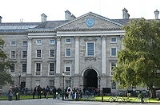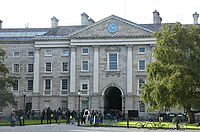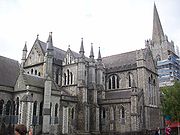
James Henthorn Todd
Encyclopedia
James Henthorn Todd was a biblical scholar, educator, and Irish
historian. He is noted for his efforts to place religious disagreements on a rational historical footing, for his advocacy of a liberal form of Protestantism
, and for his endeavours as an educator, librarian, and scholar in Irish history.
was among his younger brothers. His father died a year after he received a B.A. from Trinity College
in 1825, diminishing his prospects for success. However, he was able to remain at the college by tutoring and editing a church periodical.
 He obtained a premium in 1829, and two years later was elected Fellow, taking deacon's orders in the same year. From that time until 1850, when he became a Senior Fellow, he was among the most popular tutors in Trinity College.
He obtained a premium in 1829, and two years later was elected Fellow, taking deacon's orders in the same year. From that time until 1850, when he became a Senior Fellow, he was among the most popular tutors in Trinity College.
Todd took priest's orders in 1832. He began publishing in earnest, including papers on John Wycliffe
, church history, and the religious questions of his day. He was Donnellan Lecturer in 1838 and 1839, publishing works related to the Antichrist in which he opposed the views of the more extreme of his co-religionists who applied this term to the Roman Catholicism and the Pope
. In 1840 he graduated Doctor of Divinity.
In 1837 he had been installed Treasurer at St. Patrick's Cathedral in Dublin, and would become Precentor in 1864. His style of preaching was described as simple and lucid, and his sermons interesting. He co-founded Saint Columba's College in 1843, a school which promoted the Irish language
for those who intended to take orders, as well as promoting the principles of the Church of Ireland
.
 In 1849 Todd was made Regius Professor of Hebrew
In 1849 Todd was made Regius Professor of Hebrew
at Trinity, and a Senior Fellow the following year. In 1852 he was appointed Librarian, and working alongside John O'Donovan
and Eugene O'Curry
, he classified and arranged the collection of manuscripts. When his office received money, he spent it on the acquisition of manuscripts and rare books, and he deserves much credit for the library's high ranking as one of the chief libraries of Europe.
His secular achievements were no less remarkable. In 1840 Todd co-founded the Irish Archaeological Society and acted as its honorary secretary. He was elected a member of the Royal Irish Academy
, and strove actively to acquire transcripts and accurate accounts of Irish manuscripts from foreign libraries. He was honorary secretary from 1847 to 1855, and president from 1851 to 1856. In 1860 he was given an ad eundem degree at Oxford
.
Todd was a notable person among notable people. His work was widely respected and cited. Among his friends and acquaintances were lawyer and poet Sir Samuel Ferguson
, Conservative MP
and Roman Catholic convert Edwin Wyndham-Quin
, fellow historian William Reeves
, artist Sir George Petrie, and the Stokes family (physician father William, future lawyer and Celticist son Whitley, and future antiquarian daughter Margaret
).
James Henthorn Todd died at his house in Rathfarnham on 28 June 1869 and was buried in the churchyard of St. Patrick's Cathedral.
About his works
Irish people
The Irish people are an ethnic group who originate in Ireland, an island in northwestern Europe. Ireland has been populated for around 9,000 years , with the Irish people's earliest ancestors recorded having legends of being descended from groups such as the Nemedians, Fomorians, Fir Bolg, Tuatha...
historian. He is noted for his efforts to place religious disagreements on a rational historical footing, for his advocacy of a liberal form of Protestantism
Protestantism
Protestantism is one of the three major groupings within Christianity. It is a movement that began in Germany in the early 16th century as a reaction against medieval Roman Catholic doctrines and practices, especially in regards to salvation, justification, and ecclesiology.The doctrines of the...
, and for his endeavours as an educator, librarian, and scholar in Irish history.
Early life
He was the son of Charles Hawkes Todd, a professor of surgery, and Eliza Bentley, and was the oldest of fifteen children. Noted physician Robert Bentley ToddRobert Bentley Todd
Robert Bentley Todd was an Irish-born physician who is best known for describing the condition postictal paralysis in his Lumleian Lectures in 1849 now known as Todd's palsy. He was the younger brother of noted writer and minister James Henthorn Todd.- Early life :He was the son of physician...
was among his younger brothers. His father died a year after he received a B.A. from Trinity College
Trinity College, Dublin
Trinity College, Dublin , formally known as the College of the Holy and Undivided Trinity of Queen Elizabeth near Dublin, was founded in 1592 by letters patent from Queen Elizabeth I as the "mother of a university", Extracts from Letters Patent of Elizabeth I, 1592: "...we...found and...
in 1825, diminishing his prospects for success. However, he was able to remain at the college by tutoring and editing a church periodical.
Professional life

Todd took priest's orders in 1832. He began publishing in earnest, including papers on John Wycliffe
John Wycliffe
John Wycliffe was an English Scholastic philosopher, theologian, lay preacher, translator, reformer and university teacher who was known as an early dissident in the Roman Catholic Church during the 14th century. His followers were known as Lollards, a somewhat rebellious movement, which preached...
, church history, and the religious questions of his day. He was Donnellan Lecturer in 1838 and 1839, publishing works related to the Antichrist in which he opposed the views of the more extreme of his co-religionists who applied this term to the Roman Catholicism and the Pope
Pope
The Pope is the Bishop of Rome, a position that makes him the leader of the worldwide Catholic Church . In the Catholic Church, the Pope is regarded as the successor of Saint Peter, the Apostle...
. In 1840 he graduated Doctor of Divinity.
In 1837 he had been installed Treasurer at St. Patrick's Cathedral in Dublin, and would become Precentor in 1864. His style of preaching was described as simple and lucid, and his sermons interesting. He co-founded Saint Columba's College in 1843, a school which promoted the Irish language
Irish language
Irish , also known as Irish Gaelic, is a Goidelic language of the Indo-European language family, originating in Ireland and historically spoken by the Irish people. Irish is now spoken as a first language by a minority of Irish people, as well as being a second language of a larger proportion of...
for those who intended to take orders, as well as promoting the principles of the Church of Ireland
Church of Ireland
The Church of Ireland is an autonomous province of the Anglican Communion. The church operates in all parts of Ireland and is the second largest religious body on the island after the Roman Catholic Church...
.

Hebrew language
Hebrew is a Semitic language of the Afroasiatic language family. Culturally, is it considered by Jews and other religious groups as the language of the Jewish people, though other Jewish languages had originated among diaspora Jews, and the Hebrew language is also used by non-Jewish groups, such...
at Trinity, and a Senior Fellow the following year. In 1852 he was appointed Librarian, and working alongside John O'Donovan
John O'Donovan (scholar)
John O'Donovan , from Atateemore, in the parish of Kilcolumb, County Kilkenny, and educated at Hunt's Academy, Waterford, was an Irish language scholar from Ireland.-Life:...
and Eugene O'Curry
Eugene O'Curry
-Life:He was born at Doonaha, near Carrigaholt, County Clare, the son of Eoghan Ó Comhraí, a farmer, and his wife Cáit. Eoghan had spent some time as a travelling pedlar and had developed an interest in Irish folklore and music. Unusually for someone of his background, he appears to have been...
, he classified and arranged the collection of manuscripts. When his office received money, he spent it on the acquisition of manuscripts and rare books, and he deserves much credit for the library's high ranking as one of the chief libraries of Europe.
His secular achievements were no less remarkable. In 1840 Todd co-founded the Irish Archaeological Society and acted as its honorary secretary. He was elected a member of the Royal Irish Academy
Royal Irish Academy
The Royal Irish Academy , based in Dublin, is an all-Ireland, independent, academic body that promotes study and excellence in the sciences, humanities and social sciences. It is one of Ireland's premier learned societies and cultural institutions and currently has around 420 Members, elected in...
, and strove actively to acquire transcripts and accurate accounts of Irish manuscripts from foreign libraries. He was honorary secretary from 1847 to 1855, and president from 1851 to 1856. In 1860 he was given an ad eundem degree at Oxford
University of Oxford
The University of Oxford is a university located in Oxford, United Kingdom. It is the second-oldest surviving university in the world and the oldest in the English-speaking world. Although its exact date of foundation is unclear, there is evidence of teaching as far back as 1096...
.
Todd was a notable person among notable people. His work was widely respected and cited. Among his friends and acquaintances were lawyer and poet Sir Samuel Ferguson
Samuel Ferguson
Sir Samuel Ferguson was an Irish poet, barrister, antiquarian, artist and public servant. Perhaps the most important Ulster-Scot poet of the 19th century, because of his interest in Irish mythology and early Irish history he can be seen as a forerunner of William Butler Yeats and the other poets...
, Conservative MP
Member of Parliament
A Member of Parliament is a representative of the voters to a :parliament. In many countries with bicameral parliaments, the term applies specifically to members of the lower house, as upper houses often have a different title, such as senate, and thus also have different titles for its members,...
and Roman Catholic convert Edwin Wyndham-Quin
Edwin Wyndham-Quin, 3rd Earl of Dunraven and Mount-Earl
Edwin Richard Wyndham-Quin, 3rd Earl of Dunraven and Mount-Earl KP, FRS was a British Peer. He was styled Viscount Adare from 1824 to 1850....
, fellow historian William Reeves
William Reeves (bishop)
William Reeves was an Irish antiquarian and the Church of Ireland Bishop of Down, Connor and Dromore from 1886 until his death...
, artist Sir George Petrie, and the Stokes family (physician father William, future lawyer and Celticist son Whitley, and future antiquarian daughter Margaret
Margaret Stokes
Margaret McNair Stokes was an Irish antiquarian noted for her illustrations.Born in Dublin, she was the daughter of Sir William Stokes and his wife Mary . One brother, Whitley Stokes, was a leading Celticist, a second, William, followed their father into medicine and was a leading surgeon...
).
James Henthorn Todd died at his house in Rathfarnham on 28 June 1869 and was buried in the churchyard of St. Patrick's Cathedral.
Partial bibliography
- The Last Age of the Church, Attributed to John Wycliff (1840)
- An Apology for Lollard Doctrines, by John Wycliffe (1842)
- The Book of Obits and Martyrology of the Catholic Church of the Holy Trinity: Commonly Called Christ Church, Dublin (1844) – with John Clarke Crosthwaite
- Six Discourses on the Prophecies Relating to Antichrist in The Apocalypse of St. John (1846)
- The Search After Infallibility: Remarks on the Testimony of the Fathers to the Roman Dogma of Infallibility (1848)
- Leabhar Breathnach Annso Sis: The Irish Version of the Historia Britonum of Nennius (1848, with Herbert Algernon)
- Three Treatises by John Wycklyffe, D. D. (1851)
- A Catalogue of the Collection of Tracts for and against Popery (1859)
- The Martyrology of Donegal: A Calendar of the Saints of Ireland (1864) – with William ReevesWilliam Reeves (bishop)William Reeves was an Irish antiquarian and the Church of Ireland Bishop of Down, Connor and Dromore from 1886 until his death...
- St. Patrick, Apostle of Ireland, A Memoir of his Life and Mission (1864)
- The Books of the Vaudois: The Waldensian Manuscripts Preserved in the Library of Trinity College, Dublin (1865)
- Some Account of the Irish Manuscript Deposited by The President De Robien in the Public Library of Rennes (1867)
- Cogadh Gaedhel Re Gallaibh, or The War of the Gaedhil With the Gaill (1867) - Todd's use and translation of Scandinavian sources brought personal descriptions of the Norsemen into light, such as that of BrodirBrodirBróðir and Óspak of Man were two Danish brothers who were active in the Isle of Man and Ireland in the 11th century. They are mentioned in the 12th century Irish Cogadh Gaedhil re Gallaibh and the 13th century Icelandic Njal's Saga as key leaders who fought on opposite sides in the Battle of...
, who is reputed to have killed Brian BoruBrian BoruBrian Bóruma mac Cennétig, , , was an Irish king who ended the domination of the High Kingship of Ireland by the Uí Néill. Building on the achievements of his father, Cennétig mac Lorcain, and especially his elder brother, Mathgamain, Brian first made himself King of Munster, then subjugated...
at the Battle of ClontarfBattle of ClontarfThe Battle of Clontarf took place on 23 April 1014 between the forces of Brian Boru and the forces led by the King of Leinster, Máel Mórda mac Murchada: composed mainly of his own men, Viking mercenaries from Dublin and the Orkney Islands led by his cousin Sigtrygg, as well as the one rebellious... - A Descriptive Catalogue of the Contents of the Irish Manuscript Commonly Called The Book of Fermoy (1868)
- Leabhar Imuinn: The Book of Hymns of the Ancient Church of Ireland (1869)
External links
Several of his worksAbout his works

